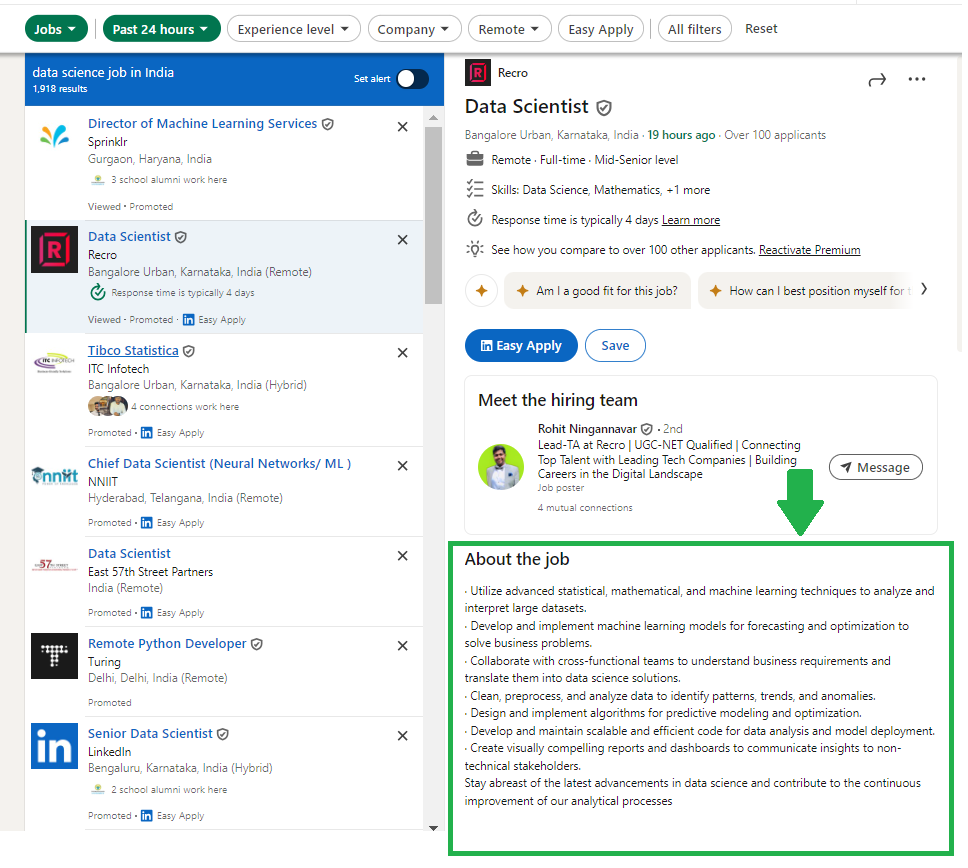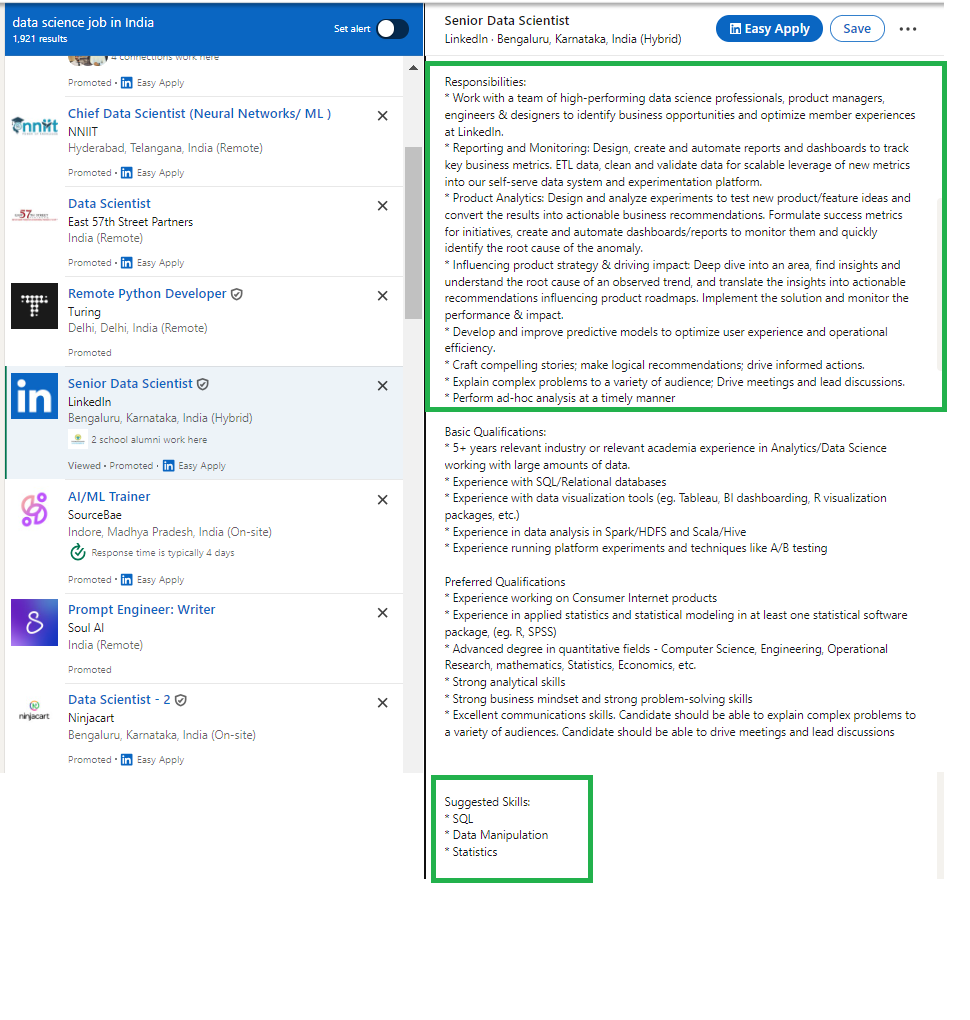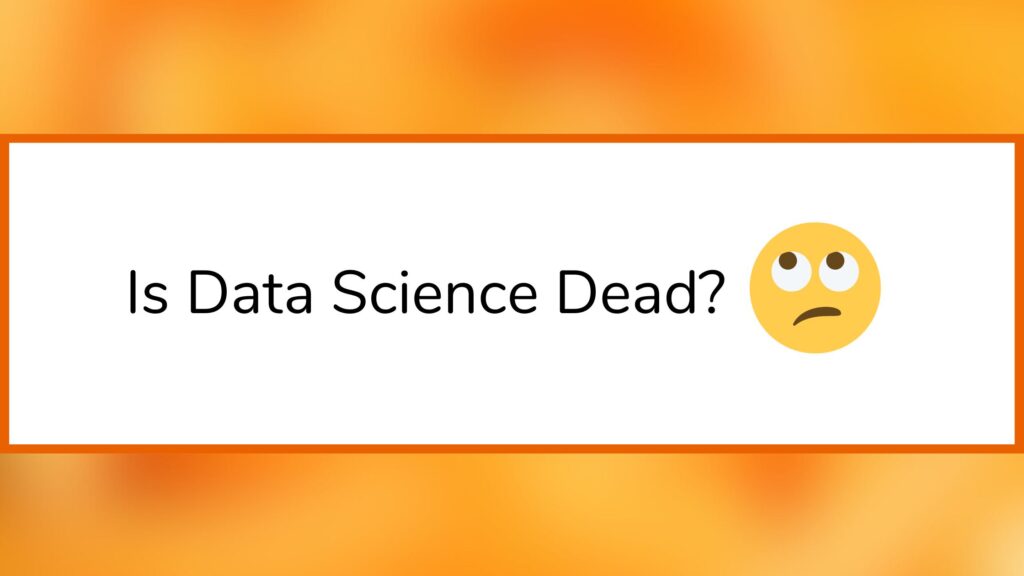Do you want to know “Is Data Science Dead in 2025?”… If yes, you are in the right place. In this blog, I will share everything you need to know about Data Science Future.
So, without any further ado, let’s get started-
Is Data Science Dead in 2025?
- AI: A New Player in the Professional World
- AI Writing Python Code: What’s the Deal?
- AI’s Role in Building KNIME Workflows
- What’s Left for Data Scientists?
- Data Science Latest Job Requirements: My Findings
- Practical Tips for Adapting
- Expert Opinions: What Do the Thought Leaders Say?
- Personal Anecdotes
- Resources and Further Reading
- Future Outlook and Predictions: What’s Next for Data Science and AI?
- Is Data Science Dead? My Honest Answer: No, It’s Not! Here’s Why.
- Conclusion:
Lately, I’ve been hearing a lot of questions about the future of data science in an AI-driven world. Some of the big ones are:
- Now that AI is here, is it still worth training your own Machine Learning models?
- Is it still worth learning Python with AI around?
- Does KNIME still matter with AI advancements?
- Is data science still needed, or should we say it’s dead?
- Do we still need data scientists?
- What about graphic designers? Do they still have a role in AI’s rise?
These are questions worth exploring, so let’s explore each one and see what’s really going on.
AI: A New Player in the Professional World
AI has made some amazing strides recently. It can now create impressive text, generate images, and more. But even though AI is getting smarter, it still has its limits.
Real-world examples of AI
- AI in Writing: AI tools can draft everything from poems to formal letters. For example, you might ask AI to write a poem for a dinner party or a complaint letter about a faulty product. These drafts can be useful, but they often need a human touch to make them really shine.
- AI-Generated Images: Tools like DALL-E can create eye-catching images from your descriptions. While these images can be stunning, they might not always meet the high standards needed for professional work. Human designers are still needed to tweak and perfect these visuals.
AI Writing Python Code: What’s the Deal?
AI’s ability to write Python code is getting better. For instance, KNIME Analytics Platform’s K-AI can generate code and help with tasks.
Practical Example
- Dennis Ganzaroli’s Project: Dennis used K-AI to generate Python code for visualizing Napoleon’s campaign data. The AI did a good job, but Dennis still had to review and adjust the code to get it just right. This shows that while AI can handle a lot, human expertise is still crucial.
How to Use AI Tools for Coding
- Step-by-Step Guide:
- Install the AI Extension: For KNIME, add the K-AI extension to your platform.
- Open KNIME Analytics Platform.
- Go to the “Help” menu and choose “Install New Software.”
- Search for “K-AI” and follow the prompts to install it.
- Restart KNIME to use the new features.
- Use the AI Chatbot: This helps you interact with AI for code generation.
- Find the chatbot icon in KNIME.
- Open it to start asking for code snippets or advice.
- Give Clear Instructions: Be specific about what you need.
- Instead of “Write Python code,” try “Write Python code to create a scatter plot with matplotlib.”
- Review and Refine: Check the AI-generated code and make adjustments as needed.
- Ensure the code works as intended and make improvements if necessary.
- Install the AI Extension: For KNIME, add the K-AI extension to your platform.
AI’s Role in Building KNIME Workflows
KNIME has added AI features with K-AI, which help build workflows and automate tasks.
Use Cases
- Workflow Assistance: K-AI can suggest steps and help create workflows. It has modes for advice and building workflows from scratch.
Comparative Analysis: AI vs. Human Expertise
| Task | AI Can Do | Humans Still Needed |
|---|
| Generate Basic Python Code | Can draft code snippets | Needed for complex tasks and debugging |
| Create Simple KNIME Workflows | Can suggest steps and automate processes | Required for complex workflows and validation |
| Write Content or Design Graphics | Can generate drafts and images | Essential for quality, creativity, and context |
What’s Left for Data Scientists?
Even with AI’s rise, data scientists still have important roles:
- Defining Tasks: Data scientists decide what needs to be done and how. AI needs clear instructions to function well.
- Quality Control: Experts must check and validate AI outputs to ensure they’re accurate and useful.
- Fine-Tuning Models: Adjusting AI models is crucial. Data scientists help make sure models perform well and meet real-world needs.
Common Misconceptions
- Myth: AI can handle all data science tasks.
- Reality: AI is a tool, not a complete solution. Humans are still needed to guide and refine projects.
- Myth: Data science knowledge is obsolete with AI.
- Reality: Understanding data science is still crucial. AI tools need human oversight to be effective.
- Myth: Data scientists will become obsolete as AI advances.
- Reality: AI enhances, but doesn’t replace, the need for data scientists’ expertise.
- Myth: AI can replace graphic designers.
- Reality: AI can generate designs, but human designers are still needed for fine-tuning and context.
Data Science Latest Job Requirements: My Findings
I recently spent some time on LinkedIn, searching for data science job postings to see what companies are really looking for these days. Based on the two job descriptions I found, it looks like there are some key skills and qualities that stand out. This is what I discovered. I am attaching the screenshots-


I found that companies are looking about-
- Strong Analytical Skills and Big Data Experience:
- Companies are searching for people who can handle large datasets and have strong analytical skills. Experience with SQL, relational databases, and big data tools like Spark, HDFS, Scala, and Hive seems to be a big plus.
- Data Visualization and Reporting Skills:
- It’s super important to be good at creating reports and dashboards that make sense of the data. Tools like Tableau and other BI dashboarding tools, as well as R visualization packages, are in high demand. You need to be able to present data in a way that is easy for non-technical folks to understand.
- Advanced Statistics and Machine Learning Techniques:
- Companies value data scientists who know their way around advanced statistical methods and machine learning techniques. They want people who can build models to solve business problems, like forecasting or optimizing operations.
- Experiment Design and Product Analytics:
- If you’re good at designing experiments (like A/B tests) and analyzing the results, you’re in luck! Many companies want data scientists who can take these results and turn them into actionable business strategies.
- Collaboration with Cross-Functional Teams:
- Being able to work well with other teams – like product managers, engineers, and designers – is a must. Companies are looking for data scientists who can understand business needs and turn them into data-driven solutions.
- Great Communication and Storytelling:
- It’s not just about crunching numbers. Companies want data scientists who can tell a story with data, make recommendations, and communicate complex ideas clearly to both technical and non-technical people.
- Business Acumen and Problem-Solving Skills:
- Understanding the business side of things is just as important as technical skills. Companies value people who can find insights, understand the “why” behind trends, and translate those insights into practical actions.
- Programming and Data Manipulation Proficiency:
- Knowing SQL and being able to manipulate data is essential. Experience with statistical tools like R or SPSS is a big advantage. Writing efficient, scalable code is also important.
- Adaptability and Continuous Learning:
- The field is always changing, so staying up-to-date with the latest trends and tools in data science is crucial. Companies appreciate candidates who are always learning and improving.
- Experience in Predictive Modeling and Applied Statistics:
- Building predictive models that help improve user experiences or solve operational challenges is a skill in high demand. Experience in applied statistics is also valued.
- Strong Educational Background:
- An advanced degree in a quantitative field like Computer Science, Engineering, Mathematics, or Statistics can really help set you apart.
- Flexibility for Ad-Hoc Analysis:
- Companies want someone who can quickly perform ad-hoc analysis when needed, showing flexibility and a quick response to changing business needs.
From what I found, it’s clear that companies are looking for data scientists who have a mix of technical skills, business understanding, and the ability to communicate effectively. So if you’re thinking about applying for a data science job, these are some of the key areas to focus on!
Practical Tips for Adapting
As AI changes the landscape, here are some tips to stay relevant:
- Keep Learning: Stay up-to-date with AI trends and tools. Take online courses or attend workshops.
- Action: Check out platforms like Coursera or Udacity for the latest courses in AI and data science.
- Build Soft Skills: Work on skills that AI can’t replicate, like communication and creativity.
- Action: Join workshops or groups that focus on public speaking or creative thinking.
- Use AI Tools Wisely: Learn how to integrate AI tools into your work for better efficiency.
- Action: Experiment with AI tools like K-AI in KNIME to see how they can help with your tasks.
- Focus on Problem-Solving: Develop your ability to tackle complex problems and make strategic decisions.
- Action: Engage in projects or case studies that challenge your problem-solving skills.
- Be Ethical: Understand the ethical side of AI and use it responsibly.
- Action: Stay informed about ethical guidelines and best practices in AI and data science.
Expert Opinions: What Do the Thought Leaders Say?
Insights from Leading Voices in AI and Data Science
I’ve been closely following thought leaders like Andrew Ng, Hilary Mason, and Cassie Kozyrkov. They all agree that while AI will automate some tasks, it will not replace the creativity, critical thinking, and ethical decision-making that data scientists bring to the table.
Andrew Ng, for example, emphasizes that AI will become a “co-pilot” for data scientists, helping them become more efficient but not replacing their unique human abilities. Cassie Kozyrkov, Chief Decision Scientist at Google, believes that human intuition and understanding of context will always be essential in data-driven decision-making.
Personal Anecdotes
From my own experience, AI has been both exciting and challenging. When I first used K-AI for a project, I was amazed at how it generated Python code for me. It was a great start, but I still had to refine the code to fit my needs perfectly. This taught me that while AI is a fantastic tool, it’s the human touch that makes all the difference.
Another time, I tried using AI to draft a blog post. The initial draft was good, but adding my personal insights and adjustments made the final piece more engaging and relevant. It’s clear that while AI can do a lot, it’s the personal touch that really enhances the outcome.
Resources and Further Reading
To stay updated and continue learning, these are some resources I recommend:
- IBM Data Science Professional Certificate– Coursera
- Become a Data Scientist– Udacity
- Data Science Specialization– Coursera
- Applied Data Science with Python Specialization– Coursera
- Programming for Data Science with Python– Udacity
- Data Science for Everyone– Datacamp
- Data Scientist with Python– Datacamp
- Data Scientist with R– Datacamp
Statistics Resources-
- Statistics with R Specialization– Coursera
- Statistics and probability– Khan Academy
- Statistics with Python Specialization– Coursera
- Learn Statistics with Python– Codecademy
- Basic Statistics– Coursera
- Statistics – Probability-TutorialsPoint
- Statistics for Data Science and Business Analysis– Udemy
- Statistical Analysis with R for Public Health Specialization– Coursera
- Intro to Statistics– Udacity
- Probability Theory, Statistics, and Exploratory Data Analysis– National Research University Higher School of Economics
Mathematics Resources-
- Mathematics for Machine Learning Specialization– Imperial College London
- Mathematics for Data Science Specialization– Coursera
- Data Science Math Skills– Duke University
- Introduction to Calculus– The University of Sydney
Data Visualization Resources-
- Tableau Tutorial– Tableau.com
- Data Visualisation with Tableau– DataCamp
- Data Visualization with Tableau Specialization–– University of California, Davis
- Data Visualization with Python– IBM
- Data Visualization– Coursera
- Data Visualization– Udacity
Future Outlook and Predictions: What’s Next for Data Science and AI?
Looking forward, I believe we will see more of AI being used to handle repetitive, mundane tasks, allowing data scientists to focus on higher-level analysis, strategic decision-making, and storytelling with data. The future is about collaboration, not competition, between AI and humans. I expect to see new roles emerge, like AI ethicists, who will help ensure these tools are used responsibly. Data science will evolve, but it won’t disappear. It will adapt, integrating AI tools while still relying heavily on human expertise.
Is Data Science Dead? My Honest Answer: No, It’s Not! Here’s Why.
No, I don’t believe data science is dead. In fact, it’s still very much alive and kicking! Let me share why I think so.
Data science continues to be an important field for understanding large amounts of data, helping businesses make smarter decisions, and solving complex problems. Yes, the field is changing—new tools, technologies, and automation are taking over some of the more routine tasks. But this doesn’t mean data science is going away. Instead, it’s evolving and becoming more connected with areas like AI, machine learning, and big data.
What I’m seeing now is a shift in the skills companies are looking for. They want data scientists who can do more than just analyze data. They’re looking for people who can understand the business side, clearly communicate insights, and work well with different teams. This change actually makes data science even more valuable because it’s about having a real impact.
So, to put it simply—no, data science is not dead. It’s growing and changing, and if we grow with it, there are still so many exciting opportunities ahead!
Conclusion:
I hope you now have an answer to the question, “Is Data Science Dead?” If you have any questions regarding “Is Data Science Dead?“, let me know in the comment.
Stay curious, keep learning, and use AI tools to complement your skills.
Happy Learning!
You May Also Be Interested In
10 Best Online Courses for Data Science with R Programming
8 Best Free Online Data Analytics Courses You Must Know in 2025
Data Analyst Online Certification to Become a Successful Data Analyst
8 Best Books on Data Science with Python You Must Read in 2025
14 Best+Free Data Science with Python Courses Online- [Bestseller 2025]
10 Best Online Courses for Data Science with R Programming in 2025
8 Best Data Engineering Courses Online- Complete List of Resources
Thank YOU!
To explore More about Data Science, Visit Here
Though of the Day…
‘ It’s what you learn after you know it all that counts.’
– John Wooden
Written By Aqsa Zafar
Founder of MLTUT, Machine Learning Ph.D. scholar at Dayananda Sagar University. Research on social media depression detection. Create tutorials on ML and data science for diverse applications. Passionate about sharing knowledge through website and social media.

